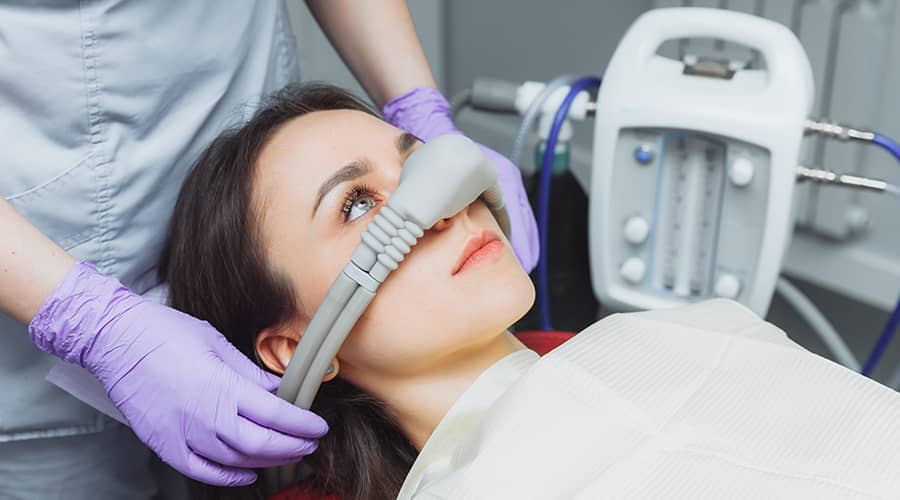
Sedation Dentistry uses medication to help you relax for a better dental care experience. Sedation dentistry can even help patients with severe dental anxiety.
Sedation dentistry offers many benefits to meet your individual needs. Sedation allows your body to relax more completely. This increases the effectiveness of local anesthesia. Sedation dentistry reduces the sensation of passing time. This can be very useful if you need complex or multiple treatments in a single sitting. It also prevents your muscles from stiffening or becoming sore due to spending extended periods of time in one position.
In every case, your sedation is closely monitored by experienced dental or medical professionals who ensure your safety and comfort.
Nitrous Oxide Analgesia
Nitrous Oxide, commonly known as laughing gas, is a mild dental analgesia medication. Once inhaled, it induces a state of mild relaxation. It also reduces sensitivity to pain. Nitrous Oxide is safe for virtually every patient, regardless of age. Following treatment, oxygen is used to neutralize the effects of nitrous oxide. Once this is complete, you will be fully alert and able to drive yourself home.
Oral Conscious Sedation
Oral Conscious Sedation, or OCS, provides a stronger level of sedation than Nitrous Oxide. Many patients prefer to use OCS for the deeper relaxation it provides. Though you are still able to stand, walk, or answer questions, you remain in a calm and drowsy state throughout the treatment. With OCS, many patients have found they have little memory of the procedure after the fact. For patients with dental anxiety, this can be a great benefit.
Morris Dental Solutions -Your Dentist in Buffalo Grove, IL
If you are searching for a dentist in Buffalo Grove, IL, who performs sedation dentistry, we can help. We offer oral conscious sedation and nitrous oxide for patients with dental anxiety or patients who are having lengthy procedures. For more complex procedures, an anesthesiologist will be present for full sedation. For more information or to book an appointment, call (847) 215-1511 or complete the online booking form.
Call UsFAQs About Sedation Dentistry
Conscious sedation in dentistry refers to the use of medications to help patients relax and manage anxiety during dental procedures while keeping them conscious and responsive. It is commonly employed for patients who experience dental phobia, have a strong gag reflex, or require extensive or invasive treatments.
The specific medications used for conscious sedation in dentistry may include benzodiazepines (such as Valium or Xanax) and nitrous oxide (also known as laughing gas). These medications are administered in carefully controlled doses to achieve the desired level of sedation and anxiety reduction.
The goal of nitrous oxide is to keep the patient in a relaxed and comfortable state while still being conscious and able to respond.
While under the influence of nitrous oxide, patients generally experience feelings of euphoria and relaxation. They may also feel light-headed, tingly, or have a sense of floating. Although these effects can create a pleasant and soothing experience, patients remain conscious and aware of their surroundings.
IV sedation is the deepest form of conscious sedation available in a dental office setting. Patients typically remain conscious and able to respond to verbal cues, similar to other forms of conscious sedation. However, the level of consciousness can vary depending on the dosage and specific medications used. IV sedation allows for a deeper level of sedation compared to other methods, such as oral sedation or nitrous oxide. It can be particularly beneficial for more complex or lengthy procedures, as it provides a higher level of comfort and relaxation for the patient.
Yes, oral conscious sedation can be effective in helping patients feel calm and relaxed during dental procedures. Oral conscious sedation involves taking sedative medication in pill form, usually about an hour before the procedure begins. The medication induces a drowsy state, although the patient remains awake and responsive.
The sedative medication used for oral conscious sedation is typically a benzodiazepine, such as Valium or Xanax. These medications have sedative and anxiolytic properties, reducing anxiety and fear associated with dental treatments.
